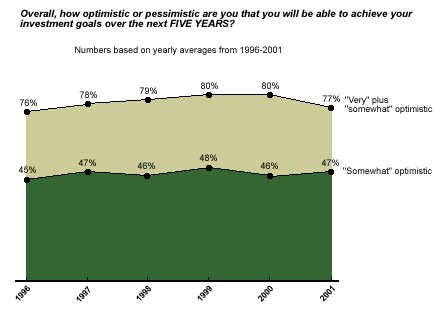Though the recession appears to be over and the stock market is rebounding, the amount of wealth destroyed in the past couple of years is leading many economists to wonder whether the "wealth effect" that drove consumer expenditures up during the boom of the late 1990s will also drive expenditures down among consumers shell-shocked by the downturn (see "Could We See a Negative Wealth Effect?"). Some economists might argue that this "negative" wealth effect is responsible for the relative weakness of upscale markets during the past several quarters.
While the surprising strength of retail consumer demand has to some extent muted the debate about the wealth effect, the fact that some of the lost wealth was in the retirement savings of millions of Americans may have a more significant and a long-term impact.
The most publicized case, the collapse of Enron, is also one of the most extreme. Enron employees lost both their jobs and their retirement savings. But millions of other Americans also lost large amounts of money. After so many years of record-breaking Dow Jones averages, today's typical saver/investor has put significant resources into stocks and bonds, rather than bank certificates of deposit (CDs) and other investments that insulate them from marketplace gains and losses. Now, because of the recession and the losses associated with it, many investors say they are going to be working longer -- and retiring later -- than they had planned to a few years ago. This new reality clearly has significant implications for the future of the job market, the need for new jobs, and the requirements of an older workforce.

Retirement Plans Delayed
Almost one in five U.S. investors say they are currently thinking about retiring later than they had been planning to before the recession started, according to a special Gallup/UBS "Index of Investor Optimism" poll* conducted in January 2002. The average length of time these investors expect to delay their retirement because of recession-related losses is 4.4 years – certainly enough to make a significant difference in these people's lives.
Among this group of investors:
- Thirty-two percent (32%) expect to retire up to two years later
- Twenty-one percent (21%) expect to retire three to four years later
- Thirty-six percent (36%) expect to retire five or more years later
- Eleven percent (11%) say they are not sure how much longer it will be before they can retire
Comfort Reduction
About one in four investors (24%) says the recession's effects will cause them to live less comfortably in retirement than they had expected to before the recession. One in five (19%) says they will live "somewhat less" comfortably. Another 5% say "a lot" less comfortably.
Investors whose retirement plans have been delayed because of the recession are particularly likely to say they will have to live less comfortably in retirement than they had previously planned. Close to half (48%) of those who say they will delay retirement because of the recession also say they will be living less comfortably than they had planned when they finally do retire. In sharp contrast, only about 18% of those not delaying retirement because of the recession say they will be living less comfortably in retirement.
Investors Depend on Their Savings for Retirement
Once upon a time, the average American's retirement savings were insulated from the ups and downs of the financial markets. But things have changed. Currently, the most frequently cited major source of retirement income among investors is the 401k, followed by personal savings or additional investments such as an IRA:
- More than half of all investors (56%) say that their 401k plan will be a major source of their retirement income.
- Nearly half of all investors (48%) say that personal savings and additional investments such as an IRA will also be major sources of their retirement income.
- Only about one-third of investors (35%) say a company pension will be a major source of their retirement income.
- Only one-fifth of investors (21%) say that Social Security will be a major source of their retirement income, but another 65% say it will be a minor source income.
- While half of all investors (50%) expect to receive some amount of inheritance, only 9% expect it to be a major source of their retirement income.
*These results are based on telephone interviews with a randomly selected national sample of 1,001 adults, 18 years and older, conducted Jan. 4-13, 2002. For results based on this sample, one can say with 95% confidence that the maximum error attributable to sampling and other random effects is ±3 percentage points. In addition to sampling error, question wording and practical difficulties in conducting surveys can introduce error or bias into the findings of public opinion polls.

